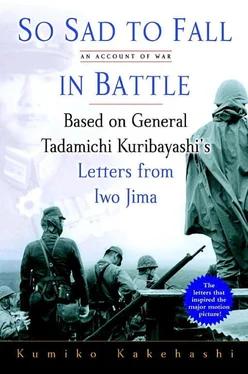In the depths of a cave near “Lieutenant General Kuribayashi’s Headquarters,” there was a father who had died a sad death with a photograph of his beloved child in his chest pocket.
A letter had also survived underneath the pitiful corpse on which scraps of rotting clothing still hung. The faded image of his child was visible in the photograph in the threadbare pocket; the letter itself was clumsily written with Japanese characters as big as your thumb in places.
Near another body Andô found a letter that a second-year elementary school student had written to his father.
Father, are you well so far away at the front? Even with you away, I’m not the tiniest bit lonely. I am studying very hard and mean to grow up into a good person. I heard from Mother that the place you are is a really nice warm place. She said you even have lots of those “banana” things! Lucky you, able to eat papayas and pineapples and other strange fruits. Mother also said that there is not enough water there, which is bad. Please take care of your health and I wish you good luck. I hope you can do your public duty cheerfully. This is what Mother and I ask God for every day.
The transport flights that brought the letters were like a narrow thread connecting the front line to home. It was on February 11, Empire Day, that the thread was cut, ratcheting up the tension and indicating that the American landing was imminent.
“From today there will be no more post.” How must the soldiers have felt when they heard that announcement?
IN FEBRUARY 2005, I was lent a scrapbook by the widow of a noncommissioned officer who had died on Iwo Jima.
The owner of the scrapbook was ninety-two-year-old Egawa Mitsue. “You can borrow this if you think it might be helpful,” she had said when she handed it to me as I was leaving her home in Iwakuni, Yamaguchi Prefecture.
Her husband, Egawa Masaharu, was drafted at the age of forty-four when he was working as deputy director of the Matsuyamachi branch of Sumitomo Bank in Osaka. He had briefly served in the army in his twenties and was sent to the front as a second lieutenant based on this experience, making him a Shôshû Shôkô , or “draftee officer.” The fact that a man in his forties should be conscripted shows just how desperate things were at this time.
The words “From the Front” were written on the scrapbook’s cover. Mitsue told me that after the war she had pasted into it every postcard her husband had sent her from the front, but when I opened it to look, the first page contained something different.
“These four letters are the last letters my eldest son and I wrote to my husband. They were returned to us undelivered.”
The letters were dated February 11 and February 12, 1945, while the postmarks from the Kisarazu Post Office were the thirteenth and fourteenth. The postal service to Iwo Jima had already been canceled by this time, but the families had no way of knowing that.
The last undelivered letter that Mitsue wrote to her husband talked about their three children, aged eight, six, and four, before ending like this:
Looking at their sleeping faces, I thought to myself, “Ah, how lucky I am.” Who wouldn’t be grateful to be blessed with three such beautiful beings? I will do my very best to bring them up to be good little children who will make you happy. I wish you could see what their life is like day to day. Let’s write as much as we can.
I turned the letter over. A label was stuck over the name of the addressee. “Not known at this address,” it said.
The three other letters were the same. “Not known at this address”: For the families back at home, this cold phrase must have been devastating.
In the margin of the page, Mitsue had written: “The letters I sent to the front started being returned to me undelivered. I grew more and more worried.” When the letters were returned to her, Mitsue did not even know where her husband was fighting.
In those days, the soldiers’ families never knew where they had been sent. When family members sent letters to Iwo Jima, they addressed them “Care of Kisarazu Post Office, Chiba Prefecture,” followed by the Japanese character for “Courage,” which was a sort of code sign indicating the 109th Division, and the name of the unit. From the letters they received, they could guess that their menfolk were somewhere in the South Seas, but they had no way of knowing precisely where.
Mitsue only discovered that her husband had been on Iwo Jima when she received the official report of his death—two years after he had gone to the front, and nine months after the war had ended. Up until then she had gone through the chaos of the immediate postwar period with the burden of three children while not even knowing if her husband was dead or alive.
A woman in her thirties who had heard that I was researching the battle of Iwo Jima told me she “knew a woman who had lost her husband at Iwo Jima” and arranged for me to meet with Mitsue. They were both Christians and attended the same church, where they had become friends despite the gap in their ages.
When I actually met Mitsue I saw that she was very much the kind of person to strike up a friendship with someone young enough to be her granddaughter. Sharp and funny, she was so full of life that she didn’t seem like a nonagenarian. Her memory was excellent, and she told me everything about her husband—from his unexpected call-up to her getting news of his death—as if it had all happened yesterday.
I could hear the sound of the sea in the living room where I sat listening to Mitsue. It was only a two-minute walk from her house down to the beach where the waves of the Inland Sea lapped gently on the shore.
On May 21, 1946, Mitsue had flung an unvarnished box into this sea—a box of the kind designed to contain the ashes of the dead.
“When I got the announcement of his death, it said I should go and collect his remains. So I went to the government office, paid 100 yen, and was handed a plain wooden box in return. But when I looked inside, there were no remains at all, just a wooden Buddhist mortuary tablet with the words: ‘Army Lieutenant Egawa Masaharu. Died in battle on Iwo Jima.’ The cold-bloodedness of it made me so furious that on my way home I thought, ‘Damn this thing,’ and threw it into the sea.”
All Mitsue was carrying when she got back home was the Buddhist mortuary tablet. She could not bring herself to throw away something that had her husband’s name on it.
EGAWA MASAHARU WAS CALLED UP ON JUNE 26, 1944. The Americans had already invaded Saipan by this time.
Masaharu had spent eight years in the United States, at the American branch of the Japanese bank for which he worked, before getting married, and he had many American friends. He was immune to wartime hysteria. Mitsue remembers him saying under his breath, “I don’t want to fight a war that we’re sure to lose,” before adding, as if on second thought, “But I’m a smart fellow. I’m sure I’ll make it back alive.”
All the letters he sent from Iwo Jima were written on postcards—twenty-eight of them in total, of which thirteen were to his children.
Hello there, everybody. Are you all well? Daddy is working hard at being a soldier.
There are lots of little birds here called white-eyes. They’re little birds that look like bush warblers, but the edges of their eyes are white. That’s why they’re called white-eyes.
Quite a long time ago, one of the soldiers caught a newborn white-eye. He put it in a cage and hung the cage from a low branch on a tree.
Every day, morning, noon, and night, the mother bird brings tasty food to feed it. The baby got bigger very fast and is learning to sing like its mother.
I want all three of you to always do what your mother tells you, and, just like the little baby white-eye, grow up to be good little children.
Читать дальше












